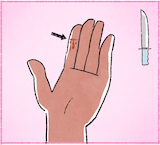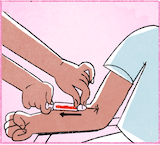

เกิดอี่หยังขึ้น มีดบาดนิ้ว มีดบาดมือของเขา มีดมันกำลังบาดมือของเขา
คือฮู้ว่ามีดบาดมือของเขา มันกะมีเลียด มีเลียดไหลออกมาจากนิ้วของเขา จากนิ้วมือของเขานั้นหละ
แล้วมีดอันนี้มันคมบ่ มีดอันนี้มันเป็นตาคมบ่ กะเป็นตาคมอยู่ ขั้นมีดมันบ่คม มันกะบ่บาด
แล้วเขาเป็นตาเจ็บบ่ กะเป็นตาเจ็บอยู่ เพาะว่ามีดมันบาดมือของเฮา เฮากะต้องเจ็บ
มือของเฮานี้สิมีจักนิ้ว กะสิมีห้านิ้ว มีนิ้วโป้ แล้วกะมีนิ้วซี้ แล้วกะมีนิ้วกาง มีนิ้วนาง แล้วกะมีนิ้วก้อย แต่ว่ามีดบาดอยู่นิ้วซี้ของเขา
15
เกิดอี่หยังขึ้น เขากำลังใซ้เข็มสีดยาดูดเลียดออกมา
เขาใซ้อุปะกอนอี่หยัง เขาใซ้เข็ม เป็นเข็มสีดยา แล้วกะดูดเลียดของเขาออกมา
แล้วพุใดเป็นพุเฮ็ด อาดสิเป็นหมอ หลือเป็นพะยาบาน หลือเป็นคนที่เซี้ยวซานด้านนี้
เขาเฮ็ดเฮ็ดหญัง เขาอาดสิเอาเลียดไปตวด หลือตวดสุกขะพาบ หลือตวดหาโลกบางสิ่งบางอย่างกะได้
แล้วเขาเจ็บบ่ กะเป็นตาเจ็บอยู่ แต่ว่ากะเจ็บแป่บเดียว เจ็บบ่โดน เจ็บตอนที่เอาเข็มเข้าไปแป่บเดียว
แล้วเขาเฮ็ดนี้อยู่ใส อันนี้กะบ่ฮู้คือกัน อาดสิอยู่โลงบาน หลืออยู่คิหนิก หลืออยู่ใสบางที่บางหม้องกะได้
Link to overview page
Link to dictionary
| Isaan | Pronunciation | Tones | Thai | English/Notes |
|---|---|---|---|---|
| เกิด | gə:t | LF | เกิด | 1. (often together with ขึ้น) to happen, to arise, to take place {เกิดอี่หยังขึ้น = what is happening?} {บ่มีหญังเกิดขึ้น = nothing's happening} 2. to be born 3. to grow {หนวดกะคือสิเกิดอยู่ใต้ดัง = a moustache grows below the nose} |
| อี่หยัง | i:-yaŋ | H-M | อะไร | 1. what {นี้คืออี่หยัง = What is this?} {มื้อนี้เจ้าเฮ็ดอี่หยัง = What are you doing today?} {กินเข้างายกับอี่หยัง = What did you have for breakfast?} 2. something, anything, (in negations) nothing {บ่ต้องเฮ็ดอี่หยังอีกเลยนอกจากใส่ปุย = [we] don't need to do anything besides adding fertilizer} |
| ขึ้น | khʉn | LF | ขึ้น | 1. to go up, to increase 2. sun: to rise {ตะเว็นกำลังขึ้น = the sun is rising} 3. more 4. bus/train etc.: to get on, to board {พุโดยสานขึ้นลดไฟเบิดแล้ว = all passengers have boarded the train} |
| มีด | mi:t | HF | มีด | knife |
| บาด | ba:t | LF | บาด | to injure, to wound, to cut |
| นิ้ว | niu | HF | นิ้ว | 1. finger 2. toe |
| มือ | mʉ: | HR | มือ | 1. hand 2. front leg/paw (e.g., of a cat) |
| ของ | khɔ:ŋ | M | ของ | of, belonging to |
| เขา | khao | M | เขา | personal pronoun: he, she |
| มัน | man | HR | มัน | it (also used to refer to people) |
| กำลัง | gam-laŋ | M-HR | กำลัง | auxiliary indicating continuous or progressive action |
| คือ | khʉ: | HR | คือ | 1. to be, to resemble, like, as 2. why {บักหล้าคือบ่เก็บโต่ะแน่ = [addressing a young boy] Why haven't you cleared the table?} |
| ฮู้ | hu: | HF | รู้ | 1. to know 2. to understand Notes: equivalent to ลู้ |
| ว่า | wa: | H | ว่า | 1. that, as {คำว่า X = the word X} 2. to say |
| กะ | ga | M | ก็ | 1. then, consequently 2. also |
| มี | mi: | HR | มี | 1. to have 2. there is |
| เลียด | li:at | HF | เลือด | blood Notes: pronunciation: also realized as เลือด |
| ไหล | lai | M | ไหล | to flow |
| ออก | ɔ:k | LF | ออก | 1. to go out, to leave 2. out |
| มา | ma: | HR | มา | 1. to come 2. auxiliary expressing action towards the present or focal time {กะคุเฮ็ดมาจากอี่หยัง = What is the bucket made of?} {แล้วเขากะเก็บเงินจากพุนั้นมา = and then she takes the money of that person} |
| จาก | ja:k | LF | จาก | 1. from {... เฮ็ดมาจากอี่หยัง = ... is made from what?} 2. to depart |
| นั้นหละ | nan-la | HF-M | นั่นแหละ | auxiliary for emphasis at the end of a phrase |
| แล้ว | lɛ:o | HF | แล้ว | 1. finished 2. already 3. and then, and next (especially แล้วกะ) 4. auxiliary for past tense |
| อัน | an | M | อัน | 1. thing, object 2. general clf. for objects |
| นี้ | ni: | HF | นี้ | 1. this 2. here |
| คม | khom | HR | คม | 1. sharp {กันไกมันคม = the pair of scissors is sharp} {แข้วหมามันคม = dog's teeth are sharp} {ขวนมันคมบ่ = Is the axe sharp?} 2. blade, sharp edge of a knife etc. {เกี่ยวมีคมคือกันกับมีด = a scythe has a blade like a knife} |
| บ่ | bɔ: | H | ไม่ | 1. no, not 2. question particle, transforming a statement into a question Notes: spelling exception in line with common usage on social media |
| เป็น | pen | M | เป็น | 1. to be, to exist 2. to be able to 3. to suffer, sth. happens to 4. เป็นหญัง[...]คือ in initial position: why? {เป็นหญังเขากะคือแปงฟัน = Why is he brushing his teeth?} {เป็นหญังเคี่ยงบินมันคือสิตก = Why is the airplane falling down?} |
| ตา | ta: | M | ตา | as a prefix: likely, worthy, fit for (like Thai น่า-) {ตาฮัก = lovely/cute} {ตาสะออน = praiseworthy} {ตาหวาน = (of ice cream) [likely to be] sweet} {ตาอยู่ = to be a good place to be} Notes: see also various entries for ตา-, e.g., ตาแซบ, ตาพู่ฮ้าย, ตาย้าน, ตาอยากหัว, ตาฮัก, ตามีแฮง |
| อยู่ | yu: | H | อยู่ | 1. to be (located) at 2. yet, still 3. auxiliary indicating continuous or progressive action {ทอดปาอยู่ในกะทะ = (in the process of) frying a fish in the pan} {แม่กำลังเมี้ยนเฮียนอยู่ = mother is cleaning/tidying up the house} |
| ขั้น | khan | LF | เมื่อ | when, if |
| เจ็บ | jep | M | เจ็บ | painful, to hurt |
| เพาะว่า | phɔ-wa: | H-H | เพราะว่า | because |
| เฮา | hao | HR | เรา | 1. personal pronoun: we 2. personal pronoun: I |
| ต้อง | tɔŋ | HF | ต้อง | to have to, must |
| สิ | si | M | จะ | future tense auxiliary {เขากำลังสิตื่น = he's about to wake up} {สิไปตะหลาด = [I'm] going to the market} |
| จัก | jak | M | จัก | 1. answer to a question: [I] don't know, don't know exactly, [I'm] not sure {พุซายคนนี้เขาเถ้าไป่ จัก จักเถ้าหลือบ่เถ้า เบิ่งบ่ค่อยออก = Is this man here already old? I don't know. I can't see clearly whether he's old or not.} {เขาเว้ากันอยู่ใส จักคือกัน = Where are they talking? I don't know either.} 2. exact(ly), what exactly {จักต้มอี่หยังกะบ่ฮู้ = I don't know what (exactly) he is cooking} {บ่ลู้คือกันจักปาอี่หยัง = I don't know either what kind of fish this is} 3. how much/many? {ต้นไม้มีจักต้น = How many trees are there?} {ตอนนี้จักโมงแล้ว = What time is it now?} {มือของเฮานี้สิมีจักนิ้ว = How many fingers do our hands have?} 4. a bit, a little bit {จักหน่อย/จักหน่อยหนึ่ง = a bit, a little bit} |
| ห้า | ha: | LF | ห้า | five |
| นิ้วโป้ | niu-po: | HF-HF | นิ้วโป้ง | thumb |
| นิ้วซี้ | niu-si: | HF-HF | นิ้วชี้ | index finger |
| นิ้วกาง | niu-ga:ŋ | HF-M | นิ้วกลาง | middle finger |
| นิ้วนาง | niu-na:ŋ | HF-HR | นิ้วนาง | ring finger |
| นิ้วก้อย | niu-gɔ:i | HF-HF | นิ้วก้อย | little finger |
| แต่ว่า | tɛ:-wa: | H-H | แต่ว่า | 1. but 2. only {ฮู้แต่ว่าเขายืนอยู่พุเดียว = I only know that he's standing there by himself} |
| ใซ้ | sai | HF | ใช้ | to use |
| เข็ม | khem | M | เข็ม | 1. hand (of watch) 2. needle |
| สีดยา | si:t-ya: | LF-M | ฉีดยา | to inject, to give an injection |
| ดูด | du:t | LF | ดูด | to suck, to absorb |
| อุปะกอน | u-pa-gɔ:n | M-M-M | อุปกรณ์ | tool |
| พุใด | phu-dai | H-M | ใคร | 1. who {มีพุใดโทมากะบ่ลู้ = I don't know who has called} {ห้องนอนของพุใด = whose bedroom (is this)? } 2. someone, somebody, anybody, in negative context: nobody {บ่มีพุใดอยู่กับเขาเลย = there's nobody with him} |
| พุ | phu | H | ผู้ | 1. person 2. clf. for people {พุหญิงพุหนึ่ง พุซายพุหนึ่ง = a woman, a man} {ซู่พุซู่คน = everybody} {พุหนึ่งโตจ่อยๆ พุหนึ่งโตบักอ้วนหนึ่ง = one person is slim, the other is fat} Notes: pronunciation: also realized as พู่- |
| เฮ็ด | het | H | ทำ | to do, to make |
| อาด | a:t | LF | อาจ | 1. might, may, will 2. likely |
| หมอ | mɔ: | M | หมอ | 1. doctor, physician 2. guy, person |
| หลือ | lʉ: | M | หรือ | or |
| พะยาบาน | pha-ya:-ba:n | H-M-M | พยาบาล | nurse Notes: see also นางพะยาบาน |
| คน | khon | HR | คน | person, people |
| ที่ | thi: | H | ที่ | 1. that, which {คนที่ยืนอยู่ฝั่งขวา = the person which is standing on the right = the person standing on the right} {เว้าคำที่บ่สุพาบ = to speak words which are impolite = to speak impolitely} 2. for ordinal numbers {ที่สาม = third} |
| เซี้ยวซาน | si:ao-sa:n | HF-HR | เชี่ยวชาญ | to be skilled, to be proficient, to be an expert in/at |
| ด้าน | da:n | HF | ด้าน | field, area |
| หญัง | ɲaŋ | M | อะไร, เป็นหญัง = ทำไม | 1. what {เขากำลังเฮ็ดหญัง = What is he doing?} {ธูปเอาไว้เฮ็ดหญัง = What are incense sticks for?} 2. something, anything, (nothing) 3. เป็นหญัง[...]คือ in initial position: why {เป็นหญังเขาคือใส่บักพิกลงไปในกวยเตียว = Why is he putting chili in [his] noodle soup?} {เป็นหญังหน้าต่างมันคือเปิด = Why is the window open?} {เป็นหญังมันคือมีควนไฟ = Why is there smoke?} |
| เอา | ao | M | เอา | to take, to give {เขากำลังเอาก่องไปซั่ง = he's taking the boxes to weigh them} {หมอกำลังเอายาให้คนป่วยกิน = the doctor is giving medicine to the patient} {เอาไว้ถ้า = is for, is used for, has the purpose of} |
| ไป | pai | M | ไป | 1. to go 2. auxiliary indicating action extending into the future |
| ตวด | tu:at | LF | ตรวจ | to check, to inspect |
| สุกขะพาบ | suk-kha-pha:p | M-M-HF | สุขภาพ | health |
| หา | ha: | M | หา | to look for, to find |
| โลก | lo:k | HF | โรค | disease, illness |
| บางสิ่งบางอย่าง | ba:ŋ-siŋ-ba:ŋ-ya:ŋ | M-H-M-H | บางสิ่งบางอย่าง | something, anything |
| ได้ | dai | HF | ได้ | 1. can 2. to get, to obtain 3. before verb: indicating past tense 4. บ่ได้ + verb: not |
| แป่บเดียว | pɛp-di:ao | H-M | แป๊บเดียว | just a moment |
| โดน | do:n | M | นาน | time: long |
| ตอน | tɔ:n | M | ตอน | when, period {ตอนสองโมงเซ้า = at 8 o'clock in the morning} {ในตอนกินเข้า = when eating} |
| เข้า | khao | LF | เข้า | to enter, to go inside, to come/go in/on {เข้าห้องน้ำ = to go to the bathroom} {เข้านอน = to go to bed} {ขี่เลียเข้าไปเกาะ = to take a boat to go on an island} |
| ใส | sai | M | (ที่)ไหน | 1. where? {สิไปใส = Where are [you] going?} {มาแต่ใส = Where are [you] coming from?} {กะทะอยู่ใส = Where's the pan?} 2. somewhere, anywhere {ใสกะได้ = anywhere, wherever you like} |
| คือกัน | khʉ:-gan | HR-M | เหมือนกัน | 1. also, likewise, similarly {ยินดีที่ได้ฮู้จักคือกันคับ = Nice to meet you too!} 2. in negative sentences: either {บ่ลู้คือกัน = I don't know either} {จักคือกัน = I don't know (either)} |
| โลงบาน | lo:ŋ-ba:n | HR-M | โรงพยาบาล | hospital Notes: variant of โลงพะยาบาน |
| คิหนิก | khi:-nik | H-M | คลินิก | clinic |
| บาง | ba:ŋ | M | บาง | 1. some {สัดบางโตบ่มีขา = some animals don't have legs} {บางคนสิมักกินกวยเตียวแทนเข้า = some people like to eat noodle soup instead of rice (dishes)} {บางสิ่งบางอย่าง = something, anything} 2. thin |
| ที่ | thi: | H | ที่ | 1. in/at {ที่นี้= here} 2. place {สิมีขายอยู่หลายที่หลายหม้อง = it is being sold in many places} {ที่นอน = sleeping place} 3. clf. for places |
| หม้อง | mɔŋ | LF | ที่, แห่ง, บริเวณ | 1. place, area {หลายที่หลายหม้อง = in many places} {หม้องใดหม้องหนึ่ง = some place} 2. clf. for places |